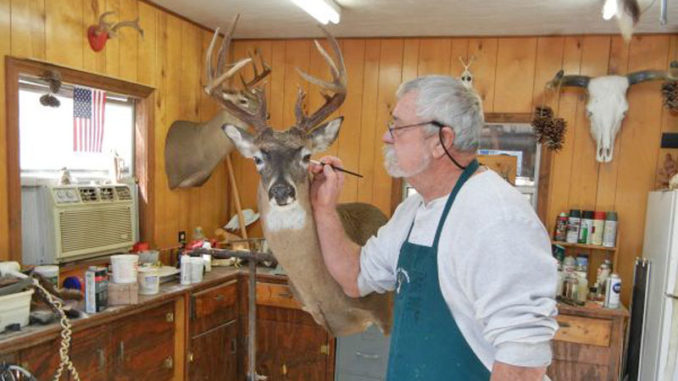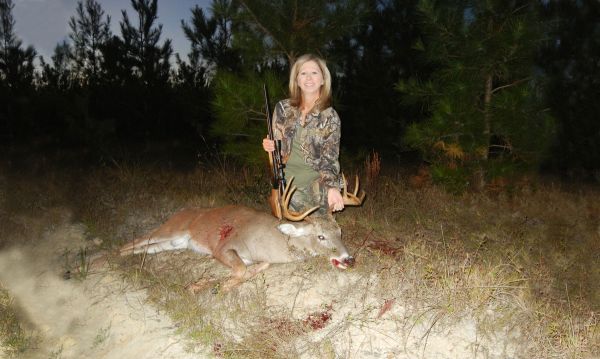
Steps to take when choosing a good processor or taxidermist
Either as a result of good fortune or skill, sooner or later a hunter will meet with success in the form of harvested game. The veteran hunter knows just what to do, and quickly begins the process of field dressing, skinning and processing meat that ultimately finds its way to the table as healthy, tasty fare for family and friends.
Small game such as squirrels, rabbits or doves can be quickly and easily dressed and freezer ready in just a few minutes. But large game such as deer and hogs require much more time and effort on the part of the hunter.
Some of my earliest memories of hunting are those of the men in our family returning from the woods with deer. Following skinning and quartering, everyone pitched in on cutting and wrapping meat on the kitchen table until the job was done.
The idea of paying someone else to process game meat never occurred to granddad. The same was true for the trophy aspect of the hunt, as well. A good set of antlers was sawed out of the skull and nailed to a post or barn wall, and that was about it.
But, as we all know, times have changed. Through no fault of their own, many modern-day hunters who grew up in more-urban settings have no idea about how to process a deer carcass. In addition many hunters have to be back on the job come Monday and don’t have the time needed for the task. And hiring a processor is usually the best way to go for successful hunters who are a long way from home.
In my opinion, it is much better to wait a couple of days while a deer or elk is processed and frozen than it is to drive for two days to get home and then face the task of processing, IF the meat didn’t spoil on the way.
As with any other service industry, some game processors and taxidermists are better than others.
During my career as a wildlife enforcement agent, I received calls from unhappy hunters regarding unsavory characters in both businesses. Understandably, a hunter suspecting he or she got a bad deal might turn to the game warden for help.
But, as I explained on more than one occasion, we can do little to help the hunter with problems such as these.
Here is one example. A few years ago, a hunter called my office complaining about a game processor. The aggrieved hunter had on two occasions taken deer to this facility for cutting, wrapping and freezing.
On one occasion he suspected he had been shorted on the meat. On the second occasion he was not even sure the meat he received had come from the deer he had dropped off for processing; it was of poor quality and had the faint, unpleasant smell of a gut-shot animal that was not handled properly. Such was not the case with the carcass he had dropped off.
Sympathy was all I could offer, along with the suggestion that he find another processor.
Department of Wildlife and Fisheries regulations require processors to comply with tagging requirements, including hunter’s name, address, license number, date, species and sex with any carcass. Department of Health and Hospitals regulations require facilities processing wild game and domestic animals to keep the two separate.
Beyond that, let the hunter beware.
Finding a processor
So how does the hunter go about choosing a good processor?
Ask around. Satisfied customers are the best advertisement for any business. On out-of-state hunts, ask outfitters or local hunters for a recommendation.
Upon arrival at the facility, take a look around. If things are neat and clean, it’s a good sign. If the person receiving the carcass for processing asks for license information, has organized record keeping and gives you an identification number, it’s another good sign.
Discuss services to be provided, price and when the meat will be ready. Are extras such as boxes and dry ice for transporting over long distances available?
The last processor I used on an out-of-state trip was good and very thorough. We discussed earliest date the meat needed to be ready, thickness of steaks and percent of beef fat added to the burger. They threw in extra dry ice at no charge, and I was happy with the quality of service and price — which means I’ll recommend them to others and hopefully will be a repeat customer.
Before we move on from meat processing, let me mention that the same holds true for additional meat preparation such as jerky or sausage. If possible, sample previously prepared products and, by all means, discuss price. On one occasion a hunting friend brought venison to a meat processor to have it mixed with pork and made into sausage. Price was not discussed, and when my friend went to pick up the sausage he got a bad case of sticker shock. The fee was outrageous, and it was an unpleasant and awkward situation. The hunter and processor finally negotiated the price down somewhat, but he still paid too much and was not happy.
Finding a taxidermist
The same precautions hold true for taxidermists. Good ones have plenty of work, and that sometimes means waiting a year or more for the finished product. But a beautiful trophy is worth the wait.
 A reputable taxidermist will ask about things such as form, ear position, direction the head should be turned and whether the hunter wants broken or damaged points repaired.
A reputable taxidermist will ask about things such as form, ear position, direction the head should be turned and whether the hunter wants broken or damaged points repaired.
If the cape from your trophy has unsightly cuts or bare spots, is substituting another cape an option? If so will you need to provide it or will the taxidermist? Some of these artists keep extra capes on hand, taken from bucks harvested by hunters who don’t care to have the deer mounted and have no use for the cape.
Whatever the case may be, the hunter should know exactly what to expect when it’s time to pick up the finished product and how much it will cost.
Here’s something else to consider: Your local Louisiana-based taxidermist has done a ton of deer. But how much experience does he have with elk, pronghorn or exotics?
I took a nice pronghorn buck in Wyoming in 2007 while hunting with fellow retired wildlife officer and good friend Rick Pallister of Buffalo, Wyoming. Rick advised me to have a local Wyoming taxidermist do the mount.
The cost was a little more to have the finished mount shipped, but every time I look at that pronghorn, I know it was the right decision.
A good hunting season closes with meat in the freezer, a trophy at the taxidermist and pleasant, happy memories. Make sure your experience with meat and trophy services providers are among those happy memories.


